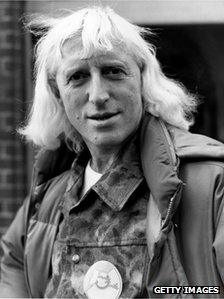Jimmy Savile: Catholic Church bid to remove papal knighthood
- Published

Savile presented BBC shows including Top of the Pops and Jim'll Fix It
The papal knighthood given to Jimmy Savile "should not have been bestowed", a Vatican spokesman has told the BBC.
The Catholic Church in England and Wales confirmed it has written to the Holy See to ask if the honour can be posthumously removed.
The Archbishop of Westminster, the Most Reverend Vincent Nichols, called for an investigation, recognising the "deep distress" of Savile's alleged victims.
Savile, who may have abused some 300 people, was granted the award in 1990.
Meanwhile, a statement released by Savile's nephew, Roger Foster, described the family's "despair and sadness" over the revelations, adding "our feelings are in turmoil as we await the next turn of events".
'Exceptional request'
Savile was made a Knight Commander of St Gregory the Great by Pope John Paul II for his charity work. It is one of the highest awards the Pope can bestow.
There is no established process to remove a papal knighthood posthumously because the honour dies with the recipient.
Speaking to BBC News, the Vatican's official spokesman Father Federico Lombardi said the Holy See "firmly condemns the horrible crimes of sexual abuse of minors," adding it considered the Savile revelations as "very grave".
"It is deeply saddened that a person who has been soiled in this way could in his lifetime have been proposed for an honour by the Holy See, which in the light of recent information should certainly not have been bestowed."
Father Lombdardi went on: "As there does not exist any permanent official list of persons who have received papal honours in the past, it is not possible to strike anyone off a list that does not exist.
"The names of recipients of papal honours do not appear in the Pontifical Year Book and the honour expires with the death of the individual.
"The most important thing, therefore, is to reaffirm the Church's condemnation of all forms of sexual abuse, and particularly abuse of minors, as extremely grave crimes. The Holy See is adamant on this point."
The Holy See is the supreme government of the Roman Catholic Church, which operates from the independent territory of the Vatican City State in Rome.
A spokesman for the Catholic Church in England and Wales confirmed Archbishop Nichols "wrote last week to the Holy See asking the competent office to investigate whether the papal honour awarded to Jimmy Savile for his charitable works could be posthumously removed and its effects nullified".
The spokesman said the Archbishop's letter was written "recognising the deep distress of all those who have suffered abuse and the disquiet at Mr Savile's name remaining on papal honours lists".
BBC under fire
He said the move was "clearly an exceptional request".
"The Church invites all those who have suffered abuse to come forward to the appropriate authorities," he added.
The Metropolitan Police has launched a criminal inquiry into the allegations against the former BBC presenter and DJ, who died in October 2011 aged 84, describing him as a predatory sex offender.
They are following 400 lines of inquiry and believe he may have sexually abused many young people and children, sometimes on BBC premises, over a 40-year period.
The BBC has been criticised for failing to stop the alleged abuse during Savile's long career at the corporation.
It is also under fire for axing a 2011 Newsnight report into the claims and its handling of the subsequent scandal.
On 13 October, BBC director general George Entwistle apologised to the women involved and announced two inquiries surrounding the allegations.
An inquiry into why the Newsnight report was dropped is already under way, led by the former head of Sky News, Nick Pollard. The results are expected in December.
The second investigation will look at whether culture and practice at the BBC at the time enabled Savile to carry out the sexual abuse of children.
This will be on hold until the police give the go-ahead and will be led by former Appeal Court judge Dame Janet Smith.
A separate review will examine the BBC's current sexual harassment policies.